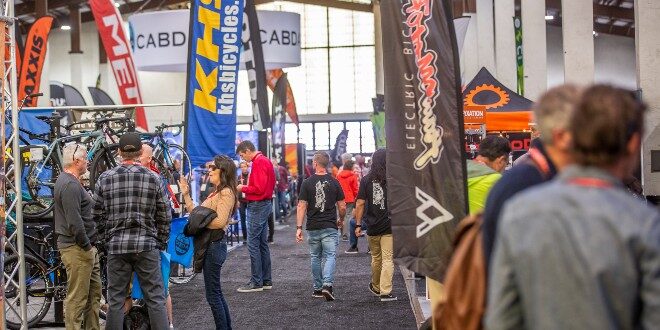Rebecca Morley catches up CABDA Expo show director Jim Kersten
With the pandemic forcing the postponement and cancellation of many trade shows and events throughout last year, it’s encouraging to see organisers hopeful of a return to physical exhibitions in the coming months as restrictions continue to ease around the world.
In the US, CABDA’s 2021 expo series will be hosted as hybrid events, with show activities taking place both in-person and virtually on the new online platform CABDA Connect. Each expo will feature two days of physical exhibits, seminars, keynotes and meetings, followed a few days later by a day of virtual activities.

Booming sales
COVID has had a huge impact on the bike trade around the world, and the US cycling industry saw ‘unprecedented’ growth last year according to the NPD Group, with the 63% year-over-year growth for bike sales in June primarily stemming from higher-end bikes typically purchased by enthusiasts, including road, gravel and full suspension mountain bikes, as well as e-bikes.
Sales of bikes with average selling prices above $1,000 also experienced growth in June 2020 compared to the same month the year before. Full suspension mountain bikes were up 92% in dollars, gravel bikes up 144%, sport performance road bikes up 87% and e-bikes up 190%.
In April last year, sales for traditional bikes, indoor bikes, parts, helmets and other accessories grew a combined 75% to $1 billion compared to the year before. Lifestyle/leisure bikes grew by 203%, front suspension mountain bikes were up by more than 150% and children’s bikes increased by 107% for the month.
“For far too long the cycling industry has been solely focused on the pinnacle athlete, but these results show that a broader, family and beginner focus can reap gains,” says Matt Powell, NPD’s sports industry advisor. “This is a silver lining, and one of the important sports retail lessons to come out of the pandemic.”
“The excitement that consumers are showing in cycling, particularly in recreational and family riding, is an absolutely amazing moment for the bike community,” says Dirk Sorenson, sports industry analyst at the NPD. “This is a unique and powerful chance for retailers, manufacturers, and non-profit organisations to engage new riders.
“Continued growth will require them not only to have product in stock, but to focus on new riders’ basic needs such as how to fix a flat tyre, or locating a family-friendly trail to ride. Addressing these basics right now has immeasurable ROI, and the industry should be laser-focused on servicing these new riders.”
Show time
CABDA Expo show director Jim Kersten says it’s been a case of ‘constantly changing expectations’, based on what they’ve heard from exhibitors, suppliers and dealers. “First, there was production, then supply. “And now all of our dealers are mostly having to pivot into other areas of the industry, so if they can’t get bicycles, they have to focus on something else. And I think last year it was mostly the service end of it. I think a lot of the suppliers are throwing everything they have at the OEM side. A lot of our people are shifting into accessories and trailers.”
CABDA’s online platform CABDA Connect will feature virtual exhibitor booths, meeting scheduling, video libraries, tech clinics and sales demos. It will also host multiple, interactive webinars over the summer. Access to the platform will be available free of charge to all registered attendees.
On the shows being hybrid events this year, Kersten says: “I didn’t know how many people they would let me put into a building. I didn’t know if there were going to be capacity restrictions, socially distanced seminar rooms. We started early, trying to come up with a technology solution for the areas that are normally concentrated – so our seminar rooms, our breakout spaces and our clinics. We ran an online only event, a strictly virtual event in February, and we were able to learn from that, what works and what doesn’t – as far as engaging people just on their phones or computers.”
February’s virtual event featured over 40 breakout sessions including sales and tech training, an industry panel discussion led by National Bicycle Dealers Association (NBDA) president Heather Mason and a keynote presentation from sales trainer Joe Marcoux. Attendees were also able to visit 50 virtual exhibit booths and schedule meetings with sales reps, as well as attend industry Q&As, live tech clinics from SRAM and a virtual job fair.
CABDA has also partnered with the NBDA for its upcoming 2021 expos, which will produce a series of breakout sessions focused on actionable industry intelligence and improving the retail experience at each of the three CABDA Expos. NBDA dealer receptions, member-focused events and IBD networking opportunities are also planned.
“So far, we’re hearing good news out of most of our venues,” says Kersten, “and it’s likely that, if we hold three events, we’ll end up with three different parameters for what we can do. We wanted to have a baseline of, at a minimum, we know we can get this information out to folks, we know we can connect with them.
“We also weren’t certain what the demand for travel was going to be. Maybe folks didn’t want to get on a plane or didn’t want to come out and travel to one of these events. But with virtual, they can do it in their house. I think the main thrust of our events will still be in person. It’s very hard to move that online – you can’t feel or touch things.

“But between the two things, if we can convert some online connections into physical encounters, I think that works. That was the idea behind the hybrid event. There was a lot of confusion as to what we’ll be allowed to do, and then not being sure what people’s demand for interactions was going to be.
“We had the rug pulled out from us many times,” continues Kersten. “We’re going to roll with the punches. I wanted to have something that we could always perform, so we know that the online event can always take place.”
Organisers have also been keeping a close eye on other industries’ events, to evaluate how additional safety measures can be deployed to protect participants. Temperature checks, dedicated entrances and exits, contactless registration, increased sanitisation intervals and prepackaged foodservice are some of the measures being put into place.
“Trying to create our own space and our own methodology for how to do stuff – the bulk of my time for the past year was how do we adapt these experiences into virtual or hybrid. We started early in the process of how do we adapt this,” continues Kersten. “We were already halfway there because we started introducing interactive apps last year for our attendees. Coming up with a way for folks to interact on site without actually going into a room with people, we already had that technology in place but getting folks at home involved in it – that was the missing part of it.”
COVID impact
Looking forward, Kersten doesn’t think the current level of demand the industry has seen will be sustained. “I see it plateauing as other options become available again – movie theatres or vacations or gyms and stuff like that coming back online. Certainly a lot of the demand will subside. But I think we’ll still be left with significantly elevated demand from pre-COVID.
“I think [COVID] had a massive impact. Year-on-year, we might see a little bit up or a little bit down but it’s been mostly stagnant for the past decade. COVID injected a whole bunch of riders, and whether they’re temporary or permanent depends a great deal on how they were welcomed into our industry.
“It’s incumbent on us as event planners or bike shop owners or bike brands to come up with ways to keep these people engaged. Whether that’s more charity rides or more inclusivity in our shops – anything we can to maintain this new group of people.”
 BikeBiz Bicycle and cycling retail news
BikeBiz Bicycle and cycling retail news




